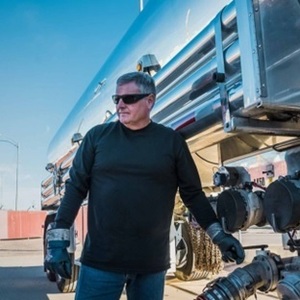Honeywell begins using SAF to test APUs, propulsion engines

January 30, 2023
BY Honeywell
Honeywell received its first delivery of sustainable aviation fuel (SAF) at its Phoenix Engines campus this week. The fuel will support development and production testing of auxiliary power units (APUs) and propulsion engines at the site, along with testing of fielded units from Honeywell’s repair and overhaul facility.
Developed by World Energy LLC in California using Honeywell’s UOP Ecofining technology and distributed by World Fuel Services, the sustainable aviation fuel (SAF) is produced by converting readily available renewable materials such as hydrotreated esters and fatty acids (HEFA). SAF can be combined with conventional jet fuel to power aircraft in blends of up to 50 percent with petroleum-based jet fuel. Blended SAF requires no changes to engine or aircraft fuel systems or fuel infrastructure. Honeywell also has plans to test other SAF blends and to run engines and APUs on 100 percent SAF in the future.
“At Honeywell, we see SAF as a logical path to decarbonize the aviation industry and we consider our facilities as laboratories for sustainable innovation,” said Dave Marinick, president of Engines and Power Systems, Honeywell Aerospace. “Honeywell has a wide variety of ready-now solutions to help create a more sustainable future for the aviation sector, and we are proud to make this progress on our sustainability commitments in our propulsion and power systems portfolio. Running our engines and APUs on SAF is a further demonstration of our commitment to our customers to do our part to reduce our carbon footprint.”
Advertisement
Advertisement
Honeywell’s first APU took to the skies in 1950, and the company has built more than 100,000 since then. More than 36,000 APUs, including both fixed wing and rotary wing, are in service today across more than 150 regional, executive, commercial and military applications.
Honeywell engines have been at the forefront of aircraft propulsion since 1953. Honeywell’s propulsion engines, like the HTF7000 with more than 1.7 million flight hours, focus on safety, performance and reliability, offering business jet operators enhanced performance and fuel efficiency at a lower cost of ownership.
Honeywell is committed to achieving carbon neutrality in its operations and facilities by 2035. About 60 percent of Honeywell’s new product introduction research and development investment is directed toward products that improve environmental and social outcomes for customers. To learn more about Honeywell’s products, services and technology that lead to more sustainable numbers, visit aerospace.honeywell.com.
Advertisement
Advertisement
Related Stories
SAF Magazine and the Commercial Aviation Alternative Fuels Initiative announced the preliminary agenda for the North American SAF Conference and Expo, being held Sept. 22-24 at the Minneapolis Convention Center in Minneapolis, Minnesota.
Saipem has been awarded an EPC contract by Enilive for the expansion of the company’s biorefinery in Porto Marghera, near Venice. The project will boost total nameplate capacity and enable the production of SAF.
Global digital shipbuilder Incat Crowther announced on June 11 the company has been commissioned by Los Angeles operator Catalina Express to design a new low-emission, renewable diesel-powered passenger ferry.
International Air Transport Association has announced the release of the Sustainable Aviation Fuel (SAF) Matchmaker platform, to facilitate SAF procurement between airlines and SAF producers by matching requests for SAF supply with offers.
Alfanar on June 20 officially opened its new office in London, further reaffirming its continued investment in the U.K. The company is developing Lighthouse Green Fuels, a U.K.-based SAF project that is expected to be complete in 2029.
Upcoming Events










